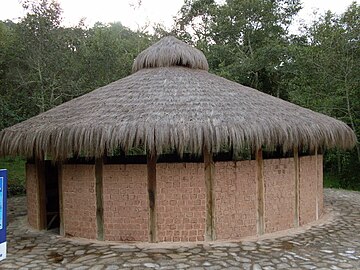Guatavita
History
Before the Spanish conquest of the Muisca on the Altiplano Cundiboyacense, the central plateau in the Colombian Andes, the area was inhabited by the Muisca organized in their Muisca Confederation. Guatavita was ruled by a cacique who was a powerful figure consulted by the zipas of Bacatá and the zaques of Hunza. Guatavita was specialized in gold working. An important temple honouring Sué, the Sun god in the religion of the Muisca was constructed in Guatavita.
In the Guatavita Lake the new zipa was inaugurated in rituals performed by the cacique of Guatavita, represented by the famous golden Muisca raft. Around 1490 the Battle of Chocontá took place where zaque Michuá was supported by the cacique of Guatavita and lost with their outnumbered army of 60,000 guecha warriors against the zipa Saguamanchica. Both Muisca rulers died in this battle.
Modern Guatavita was founded on March 18, 1593, by Miguel de Ibarra.
Guatavita was rebuilt on higher ground in the mid-1960s due to the construction of the Tominé Reservoir, which intentionally flooded the area of the town.
Etymology
In the Chibcha language of the Muisca, Guachetá means "end of the farming fields" or "point of the mountain range".
Economy
Main economical activities in Guatavita are agriculture, mining and tourism. In terms of agriculture most common are potatoes, maize, barley and peas. Tourism is mainly in the weekends when craft markets open in town.
Guatavita Lake
The sacred and ceremonial Lake Guatavita, of the pre-Columbian Muisca is located nearby, within the Sesquilé municipality of Almeidas Province.
Climate
| Climate data for Guatavita, elevation 2,625 m (8,612 ft), (1971–2000) | |||||||||||||
|---|---|---|---|---|---|---|---|---|---|---|---|---|---|
| Month | Jan | Feb | Mar | Apr | May | Jun | Jul | Aug | Sep | Oct | Nov | Dec | Year |
| Mean daily maximum °C (°F) | 20.5 (68.9) |
20.6 (69.1) |
20.7 (69.3) |
20.1 (68.2) |
19.2 (66.6) |
18.1 (64.6) |
17.8 (64.0) |
18.3 (64.9) |
19.0 (66.2) |
19.5 (67.1) |
19.6 (67.3) |
19.7 (67.5) |
19.4 (66.9) |
| Daily mean °C (°F) | 13.7 (56.7) |
14.0 (57.2) |
14.4 (57.9) |
14.4 (57.9) |
14.3 (57.7) |
13.5 (56.3) |
13.1 (55.6) |
13.2 (55.8) |
13.5 (56.3) |
13.7 (56.7) |
13.9 (57.0) |
13.7 (56.7) |
13.8 (56.8) |
| Mean daily minimum °C (°F) | 8.6 (47.5) |
9.3 (48.7) |
10.2 (50.4) |
10.8 (51.4) |
10.8 (51.4) |
10.5 (50.9) |
10.2 (50.4) |
9.7 (49.5) |
9.4 (48.9) |
9.7 (49.5) |
10 (50) |
8.9 (48.0) |
9.8 (49.6) |
| Average precipitation mm (inches) | 32.0 (1.26) |
40.9 (1.61) |
65.2 (2.57) |
89.9 (3.54) |
78.7 (3.10) |
52.6 (2.07) |
50.0 (1.97) |
47.6 (1.87) |
53.8 (2.12) |
73.1 (2.88) |
58.8 (2.31) |
46.1 (1.81) |
688.6 (27.11) |
| Average precipitation days | 7 | 10 | 14 | 17 | 19 | 21 | 22 | 20 | 16 | 15 | 13 | 10 | 184 |
| Average relative humidity (%) | 74 | 74 | 76 | 79 | 79 | 79 | 78 | 78 | 78 | 79 | 78 | 76 | 77 |
| Source: Instituto de Hidrologia Meteorologia y Estudios Ambientales | |||||||||||||
Gallery
-
Central square
-
Obelisk
-
Typical houses
-
Reconstructed bohío of the Muisca
-
Crafts market
-
Flowers and park
-
Rural area
-
Tominé Reservoir
References
- ^ (in Spanish) Official website Guatavita Archived 2016-01-30 at the Wayback Machine - accessed 05-05-2016
- ^ Ocampo López, Javier (2013), Mitos y leyendas indígenas de Colombia - Indigenous myths and legends of Colombia (in Spanish), Bogotá, Colombia: Plaza & Janes Editores Colombia S.A., pp. 1–219, ISBN 978-958-14-1416-1
- ^ (in Spanish) History of the Muisca Archived 2020-10-28 at the Wayback Machine - Banco de la República - accessed 05-05-2016
- ^ "Promedios Climatológicos 1971–2000" (in Spanish). Instituto de Hidrologia Meteorologia y Estudios Ambientales. Retrieved 25 June 2024.
External links
- Photos of Guatavita Archived 2012-02-13 at the Wayback Machine
- (in Spanish) Nature and Culture of Guatavita







